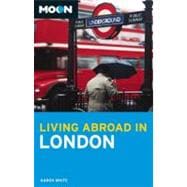Freelance writer and adoptive Londoner Karen White knows what it takes to make the move to London. In Moon Living Abroad in London, she shares her seasoned advice on transplanting to this bustling English city. From obtaining visas and arranging your finances to finding employment and choosing schools for your kids, White uses her firsthand knowledge of London to ensure that you have all the tools you need to navigate the ins and outs of the moving process.
Packed with essential information and must-have details on setting up daily life, plus extensive color and black and white photos, illustrations, and maps, Moon Living Abroad in London will help you find your bearings as you settle into your new home and life abroad.
Packed with essential information and must-have details on setting up daily life, plus extensive color and black and white photos, illustrations, and maps, Moon Living Abroad in London will help you find your bearings as you settle into your new home and life abroad.








